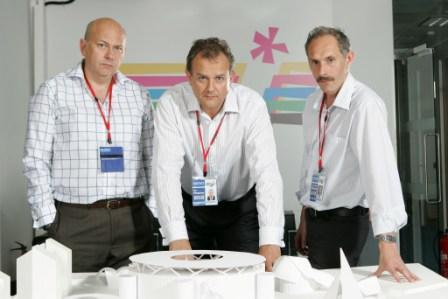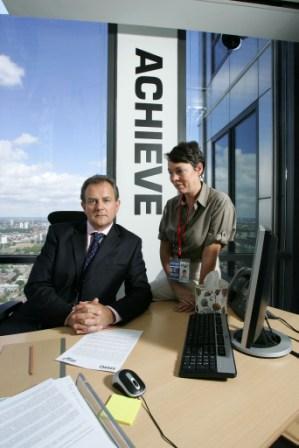Twenty Twelve, BBC Four | reviews, news & interviews
Twenty Twelve, BBC Four
Twenty Twelve, BBC Four
Enjoyable comedy satirising the countdown to London's 2012 Olympics

As it turned out, Irving Berlin's jauntily fatalistic Let’s Face the Music and Dance proved the perfect theme tune for BBC Four's new six-part comedy series. A mock documentary following the people responsible for delivering a successful 2012 London Olympics, the basic premise of Twenty Twelve was simple: give practically any loose coalition of personalities £9 billion to organise an event of global significance and they will almost certainly turn into gibbering idiots.
Written by John Morton, the pen behind the fondly recalled People Like Us, Twenty Twelve was set in the glistening steel-and-glass “engine room” of the Olympic Deliverance team, the ideal environment for several comedic archetypes to report for duty.
This wasn’t a critique on the Olympic bid so much as a chance to marvel at the age-old comic staple of bumbling British bureaucracy
Hugh Bonneville played – with his usual doleful plausibility - Ian Fletcher, Head of Deliverance, a thoroughly modern title for a very old-fashioned job spec: to bring in the goods on time and on budget. Fletcher was the kind of evasive, post-Blair blank canvas who lamented that a weekend in Barcelona with his wife had been “rebranded as a romantic mini-break”. Wrestling gamely with the on-message executive's must-have transport accessory, the folding bike, he clung fast to his vision of a decent, upstanding, defiantly middle-brow Britain despite the fact that it was disappearing in front of his eyes faster than Eddie the Eagle on black ice.
The ever-admirable Olivia Colman was his subservient PA Sally, a surrogate wife fattening him up with suitably Olympian sandwiches and desperately trying - and failing - to break down his utter indifference with sheer efficiency. But the star turn came from Jessica Hynes as Siobhan Sharpe, ur-PR and Head of Brand. After the disaster of her primetime BBC One sitcom According to Bex, it was cheering to see Hynes back on form. “Mmkay, here’s the thing...” Siobhan continually hymned, without once having the faintest clue what “the thing” might be. "Totally, totally," she nodded manically at every passing comment as she frantically attempted to put a positive spin on each looming catastrophe.
 The rest of the cast were similarly excellent, even if they all employed those familiar mock-doc tropes: furtive glances at the camera; painfully pregnant pauses and long, uncomfortable silences. We’ve seen it all before, of course, but it's rarely been done better, perhaps because it was Morton who, pre-The Office, was partially responsible for popularising this style with People Like Us.
The rest of the cast were similarly excellent, even if they all employed those familiar mock-doc tropes: furtive glances at the camera; painfully pregnant pauses and long, uncomfortable silences. We’ve seen it all before, of course, but it's rarely been done better, perhaps because it was Morton who, pre-The Office, was partially responsible for popularising this style with People Like Us.
The fact that Ian was the model of efficiency compared to his colleagues told us all we needed to know about the disastrous trajectory of the project. Nick, Head of Contracts, (pictured above on the left) was an unreconstructed Yorkshireman whose blunt impatience was expertly personified by Vincent Franklin.
Nick had a bee in his bonnet about female high fliers, who he preferred to call “luv” lest he appeared in any way cowed, but his eccentricities paled next to Head of Infrastructure Graham (pictured above on the far right), a rodenty loose cannon played by Karl Theobald as the spiritual soul mate of MacKenzie Crook’s Gareth from The Office. With his panicky stare and circular babble about “surgical bullets” you wouldn’t have trusted Graham with a potato peeler never mind phasing London’s traffic-light system, a task he likened to “doing open heart bypass surgery only with the patient actually alive”. He duly unleashed capital-sized chaos from his laptop: by the end of the episode the patient was firmly dead and everyone from his boss to Boris Johnson and Seb Coe was snared in its corpse.
Yes, these were broad stereotypes and the naturalism came with a blaring neon trim, but the laughs were strong and frequent. It helped that Morton displayed a keen eye for "on-trend" absurdities, which meant the real joy of Twenty Twelve lay in the details. Siobhan’s PR company Perfect Curve was brilliantly evoked, from hapless online guru and geek-chic slave Barney to the racks of artfully Minimalist shelves. The see-what-sticks list of national heroes also had the horrible ring of authenticty: “Bruce Forsyth, Stephen Fry obviously, Gok Wan, Trinny and Susannah...” There was some confusion over Carol Ann Duffy and Duffy the singer; Peter Andre ended up as principal torch bearer.
 Everyone was glued to their mobiles or hunched in meeting rooms speaking fluent Nathan Barley. If they weren’t “breaking open the google-juice and going viral”, then it was all about “2012, 2.0”. Sally (pictured left) seemed to have a take-away low-fat decaf permanently glued to the place where her right hand used to be. The smugly intimate narration from David Tennant (who long before entering the Tardis was in People Like Us) was pitch-perfect, while the spectre of Boris hovered just out of shot, a cross between blonde bogey man and particularly demanding toddler, stomping his feet until he was invited to the party.
Everyone was glued to their mobiles or hunched in meeting rooms speaking fluent Nathan Barley. If they weren’t “breaking open the google-juice and going viral”, then it was all about “2012, 2.0”. Sally (pictured left) seemed to have a take-away low-fat decaf permanently glued to the place where her right hand used to be. The smugly intimate narration from David Tennant (who long before entering the Tardis was in People Like Us) was pitch-perfect, while the spectre of Boris hovered just out of shot, a cross between blonde bogey man and particularly demanding toddler, stomping his feet until he was invited to the party.
The party in question was held to unveil the Thousand Day Clock, a New Labour-style totem dripping with entry-level symbolism of the most excruciating kind. Designed to track the final countdown to July 2012 – “What we have here, guys, is a total game changer,” barked Siobhan – it was an unusually ludicrous contraption, its ugly uselessness obvious to all except PR ("It's, like, totally sensational") and creator, a terminally chippy northern YBA beavering away on inane "installations" in his Shoreditch studio.
Rather than satire, it was this kind of slightly surreal silliness which prevailed. Twenty Twelve had no serious intent to wound. Next week’s episode involves nothing more savage than the Deliverance coach getting lost on the way to the Olympic stadium. Seb Coe plays himself and escapes entirely unscathed. This, then, isn’t a critique on the political and social ramifications of hosting the Olympics so much as a chance to marvel at the age-old comic staple of bumbling British bureaucracy and its peculiar gift for mismanaging a piss-up in a brewery.
The bracing opening episode was all about the comedy of incompetence and misunderstanding. The targets - corporate jargon, delusionally humourless PRs, idiot art prats - may have been soft but Twenty Twelve punched hard where it mattered and hit the most important target of all: it was actually funny.
Explore topics
Share this article
Add comment
The future of Arts Journalism
You can stop theartsdesk.com closing!
We urgently need financing to survive. Our fundraising drive has thus far raised £49,000 but we need to reach £100,000 or we will be forced to close. Please contribute here: https://gofund.me/c3f6033d
And if you can forward this information to anyone who might assist, we’d be grateful.

Subscribe to theartsdesk.com
Thank you for continuing to read our work on theartsdesk.com. For unlimited access to every article in its entirety, including our archive of more than 15,000 pieces, we're asking for £5 per month or £40 per year. We feel it's a very good deal, and hope you do too.
To take a subscription now simply click here.
And if you're looking for that extra gift for a friend or family member, why not treat them to a theartsdesk.com gift subscription?
more TV
 The Monster of Florence, Netflix review - dramatisation of notorious Italian serial killer mystery
Director Stefano Sollima's four-parter makes gruelling viewing
The Monster of Florence, Netflix review - dramatisation of notorious Italian serial killer mystery
Director Stefano Sollima's four-parter makes gruelling viewing
 The Diplomat, Season 3, Netflix review - Ambassador Kate Wyler becomes America's Second Lady
Soapy transatlantic political drama keeps the Special Relationship alive
The Diplomat, Season 3, Netflix review - Ambassador Kate Wyler becomes America's Second Lady
Soapy transatlantic political drama keeps the Special Relationship alive
 The Perfect Neighbor, Netflix review - Florida found-footage documentary is a harrowing watch
Sundance winner chronicles a death that should have been prevented
The Perfect Neighbor, Netflix review - Florida found-footage documentary is a harrowing watch
Sundance winner chronicles a death that should have been prevented
 Murder Before Evensong, Acorn TV review - death comes to the picturesque village of Champton
The Rev Richard Coles's sleuthing cleric hits the screen
Murder Before Evensong, Acorn TV review - death comes to the picturesque village of Champton
The Rev Richard Coles's sleuthing cleric hits the screen
 Black Rabbit, Netflix review - grime and punishment in New York City
Jude Law and Jason Bateman tread the thin line between love and hate
Black Rabbit, Netflix review - grime and punishment in New York City
Jude Law and Jason Bateman tread the thin line between love and hate
 The Hack, ITV review - plodding anatomy of twin UK scandals
Jack Thorne's skill can't disguise the bagginess of his double-headed material
The Hack, ITV review - plodding anatomy of twin UK scandals
Jack Thorne's skill can't disguise the bagginess of his double-headed material
 Slow Horses, Series 5, Apple TV+ review - terror, trauma and impeccable comic timing
Jackson Lamb's band of MI5 misfits continues to fascinate and amuse
Slow Horses, Series 5, Apple TV+ review - terror, trauma and impeccable comic timing
Jackson Lamb's band of MI5 misfits continues to fascinate and amuse
 Coldwater, ITV1 review - horror and black comedy in the Highlands
Superb cast lights up David Ireland's cunning thriller
Coldwater, ITV1 review - horror and black comedy in the Highlands
Superb cast lights up David Ireland's cunning thriller
 Blu-ray: The Sweeney - Series One
Influential and entertaining 1970s police drama, handsomely restored
Blu-ray: The Sweeney - Series One
Influential and entertaining 1970s police drama, handsomely restored
 I Fought the Law, ITVX review - how an 800-year-old law was challenged and changed
Sheridan Smith's raw performance dominates ITV's new docudrama about injustice
I Fought the Law, ITVX review - how an 800-year-old law was challenged and changed
Sheridan Smith's raw performance dominates ITV's new docudrama about injustice
 The Paper, Sky Max review - a spinoff of the US Office worth waiting 20 years for
Perfectly judged recycling of the original's key elements, with a star turn at its heart
The Paper, Sky Max review - a spinoff of the US Office worth waiting 20 years for
Perfectly judged recycling of the original's key elements, with a star turn at its heart
 The Guest, BBC One review - be careful what you wish for
A terrific Eve Myles stars in addictive Welsh mystery
The Guest, BBC One review - be careful what you wish for
A terrific Eve Myles stars in addictive Welsh mystery

Comments
...